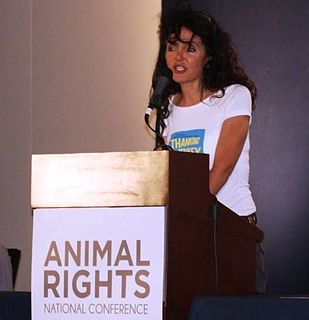A Quote by Karen Dawn
I don't understand "animal people" who say they are not environmentalists. Do they not realize that the vast majority of animals live in the environment?
Quote Topics
Related Quotes
We have to create more and more vegetarians, and help people to understand that it is not only the suffering of the animals (which is what made me vegetarian) but also the incredible harm to the environment, the tremendous amount of greenhouse gas created by the whole vast machinery of intensive animal farming.
I believe that the best way to create good living conditions for any animal, whether it's a captive animal living in a zoo, a farm animal or a pet, is to base animal welfare programs on the core emotion systems in the brain. My theory is that the environment animals live in should activate their positive emotions as much as possible, and not activate their negative emotions any more than necessary. If we get the animal's emotions rights, we will have fewer problem behaviors... All animals and people have the same core emotion systems in the brain.
I am still passionate about Grizzly bears as well as the rest of the animal kingdom and I understand now how precious people are that stand for all of the animal kingdom. I would like to work extensively with the animals as well as bringing forth awareness to those on earth that have similar passions for animals as I had.
Cities are responsible for the vast majority of the creation of the economy. They're also places into which we pour the vast majority of resources, the vast majority of energy and the places where a huge percentage of the decisions about how systems are built and how products designed, etc., happen.
It's upsetting to me that so many people think of themselves as environmentalists and still eat meat and dairy products. I think it's something people should be considering given the emergency situation we're in regarding water supplies, global warming, and the destruction of ecosystems. There's a lot of overlap between animal rights and the environment.
People come to me and say, 'What'll I do if I go in the water and see a shark?' You don't have to do anything. The chances of that shark attacking you in any way is so remote. The sea should be enjoyed, the animals in it. When you see a shark underwater, you should say, 'How lucky I am to see this beautiful animal in his environment!'
I studied a lot of animal behavior and one of the things I find really interesting is the whole idea that animals are sensory based thinkers and I wrote about this in my book, Animals in Translation. That an animal's memory is not in words, they've got to be in pictures - it's very detailed so let's say the animal gets afraid of something - they'll get afraid of something that they're looking at or hearing, the moment the bad thing happens.
If you would understand this secret, you must first understand the distinction between training an animal and educating one. Trained animals are relatively easy to turn out. All that is required is a book of instructions, a certain amount of bluff and bluster, something to use for threatening and punishing purposes, and of course the animal. Educating an animal, on the other hand, demands keen intelligence, integrity, imagination, and the gentle touch, mentally, vocally, and physically.
































